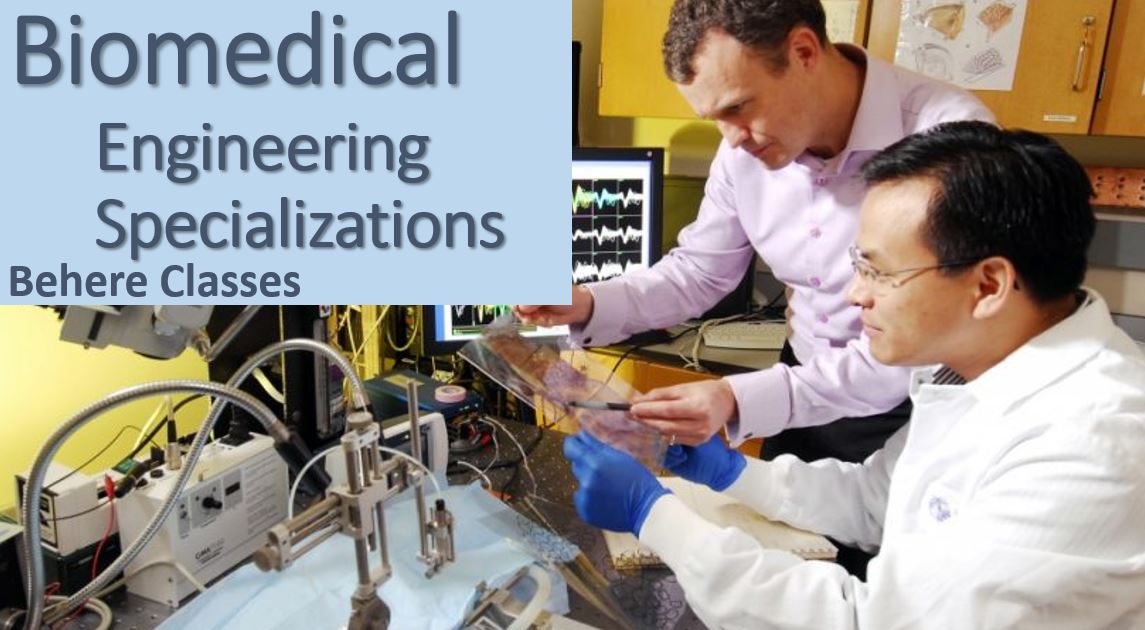Exploring Specializations in Biomedical Engineering
Sectors Encompassing Biomedical Engineering:
1. Healthcare Facilities
2. Medical Device Manufacturing
3. Research Institutions
4. Biotechnology Companies
5. Regulatory Compliance
6. Rehabilitation Engineering
7. Pharmaceutical Industry
8. Academic Institutions
These sectors cover a wide range of roles, from designing medical devices to conducting research and ensuring regulatory compliance.
Duration & course Level:
1. Biomedical Imaging: M.S. or Ph.D., 2-5 years
2. Biomaterials Engineering: B.S. or M.S., 4-6 years
3. Biomechanics: M.S. or Ph.D., 2-5 years
4. Bioinformatics: B.S., M.S., or Ph.D., 4-7 years
5. Medical Device Design and Development: M.S., 2 years
6. Tissue Engineering: M.S. or Ph.D., 2-5 years
7. Rehabilitation Engineering: M.S. or Ph.D., 2-5 years
8. Pharmaceutical Engineering: M.S. or Ph.D., 2-5 years
9. Clinical Engineering: M.S. or Ph.D., 2–5 years
10. Regenerative Medicine: M.S. or Ph.D., 2-5 years
Salary Package:
1. Biomedical Imaging: $60, 000 - $100, 000 per year
2. Biomaterials Engineering: $65, 000 - $110, 000 per year
3. Biomechanics: $70, 000 - $120, 000 per year
4. Bioinformatics: $75, 000 - $130, 000 per year
5. Medical Device Design and Development: $70, 000 - $120, 000 per year
6. Tissue Engineering: $65, 000 - $110, 000 per year
7. Rehabilitation Engineering: $60, 000 - $100, 000 per year
8. Pharmaceutical Engineering: $75, 000 - $130, 000 per year
9. Clinical Engineering: $70, 000 - $120, 000 per year
10. Regenerative Medicine: $65, 000 - $110, 000 per year
These figures may vary based on factors such as experience, location, employer, and industry sector.
Specializations:
1. Biomedical Imaging
2. Biomaterials Engineering
3. Biomechanics
4. Bioinformatics
5. Medical Device Design and Development
6. Tissue Engineering
7. Rehabilitation Engineering
8. Pharmaceutical Engineering
9. Clinical Engineering
10. Regenerative Medicine
Education & Training Requirements:
1. Biomedical Imaging: Bachelor's degree, followed by a master's or doctoral degree focusing on imaging technologies.
2. Biomaterials Engineering: Bachelor's degree, followed by a master's or doctoral degree specializing in biomaterials.
3. Biomechanics: Bachelor's degree, followed by a master's or doctoral degree in biomechanics.
4. Bioinformatics: Bachelor's degree, followed by a master's or doctoral degree in bioinformatics.
5. Medical Device Design and Development: Bachelor's degree, followed by a master's degree in medical device design.
6. Tissue Engineering: Bachelor's degree, followed by a master's or doctoral degree in tissue engineering.
7. Rehabilitation Engineering: Bachelor's degree, followed by a master's or doctoral degree in rehabilitation engineering.
8. Pharmaceutical Engineering: Bachelor's degree, followed by a master's or doctoral degree in pharmaceutical engineering.
9. Clinical Engineering: Bachelor's degree, followed by certification as a clinical engineer.
10. Regenerative Medicine: Bachelor's degree, followed by a master's or doctoral degree in regenerative medicine.
Industrial Overview:
Biomedical engineering drives innovation in healthcare across diverse industries, including medical device manufacturing, pharmaceuticals, and research institutions. Engineers in this field design advanced medical equipment, develop drug delivery systems, and conduct groundbreaking research to address healthcare needs. With its interdisciplinary approach, biomedical engineering plays a crucial role in shaping the future of medicine.
Industry/field Future:
Biomedical engineering's future is promising, driven by tech advancements and healthcare demands. With aging populations and personalized medicine trends, innovative medical solutions are crucial. Emerging fields like regenerative medicine offer exciting opportunities. Biomedical engineers will continue to address global health challenges and enhance healthcare delivery.

